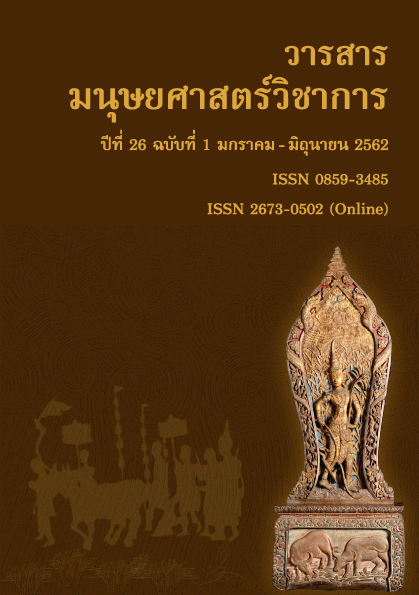Enregisterment A Linguistic Anthropological Concept
Main Article Content
Abstract
Enregisterment is a linguistic anthropological framework which describes a semiotic process in which ways of speaking become indexically linked to certain social qualities and values. In this process, linguistic repertoires are given metapragmatic labels and stereotypes which are socially regulated, typified, and mobilized across multiple time-spaces. This results in what sociolinguists call, “registers,” widely recognized ways of speaking within a speech community which usually get sociopolitically organized and hierarchized. In this article, I propose that the usefulness of the enregisterment concept is not limited to the study of language but also the study of other semiotics forms including person-type labels. As this theoretical framework emphasizes the mobility of signs, it calls our attention to the trajectory of semiotic forms across multiple modalities of discursive interaction. The analytical framework of enregisterment will guide us to new research questions as well as diverse methodological approaches, which is beneficial to research on language, culture, and society in Thai contexts both theoretically and methodologically.
Article Details
References
ออมสิน บุญเลิศ. (2552). วาทกรรมว่าด้วย “คนต่างด้าว” กับการกลายเป็น “คนอื่น” ของชาวไทใหญ่พลัดถิ่น. วารสารสังคมศาสตร์, 21(2), 103-141.
Agha, A. (2003). The social life of cultural value. Language and Communication, 23(3), 231-273.
Agha, A. (2005). Voice, Footing, Enregisterment. Journal of Linguistic Anthropology, 15(1), 38-59.
Agha, A. (2007). Language and social relations. New York: Cambridge University Press.
Ali, S. R., et al. (2013). Strike a Pose: Comparing Associated Press and UNICEP Visual Representations of the Children of Darfur. African Conflict and Peacebuilding Review, 3(1), 1-26.
Althusser, L. (1971). Ideology and Ideological State Apparatuses. In Lenin and Philosophy and Other Essays (pp. 121-176). New York: Monthly Review Press.
Aries, P. (1962). Centuries of Childhood: A Social History of family life. New York: Vintage Books, a division of Random House.
Bakhtin, M. M. (1981). Discourse in the Novel. In M. Holquist (Ed.), C. Emerson & M. Holquist (Trans.), The Dialogic Imagination: Four Essays (pp. 259-422). Austin: University of Texas Press.
Bakhtin, M. M. (1984). Problems of Dostoevsky’s Poetics (C. Emerson, Ed. & Trans). Minneapolis: University of Minneapolis Press.
Blommaert, J. (2010). The sociolinguistics of globalization. Cambridge, UK; New York: Cambridge University Press.
Bolletta, G. (2016). The Good Child’s Duties: Childhood in Militarized Thailand. Kyoto Review of Southeast Asia, Young Academic’s Voice, 19, Retrieved from https://kyotoreview.org/yav/childhood-militarized-thailand/.
Bourdieu, P. (1991). Language and Symbolic Power. Cambridge, MA: Harvard University Press.
Bucholtz, M. (2011). White kids: Language, race and styles of youth identity. Cambridge: Cambridge University Press.
Carr, S. (2011). Scripting Addiction: The Politics of Therapeutic Talk and American Sobriety. Princeton: Princeton University Press. Chun, E. W. (2011). The Construction of White, Black, and Korean American Identities through African American Vernacular English. Journal of Linguistic Anthropology, 11(1), 52-64. Davidson, J. O. (2011). Moving Children? Child Trafficking, Child Migration, and Child Rights. Critical Social Policy 31, 454. Douglas M. (1986). How Institutions Think. Syracuse, NY: Syracuse University Press
Eckert, P. (1989). Jocks and Burnouts: Social Categories and Identity in the High School. New York: Teachers College, Columbia University. Eckert, P. (2000). Linguistic Variation as Social Practice. London: Blackwell Publishers. Gal, S. (1989). Language and Political Economy. Annual Review of Anthropology, 18, 345-367.
Gal, S. and J. T. Irvine. (2000). Language Ideology and Linguistic Differentiation. In P. Kroskrity (Ed.), Regimes of Language: Ideologies, Polities, and Identities (pp. 35-83). Santa Fe: SAR Press.
Gumperz, J. J. (1964). Linguistics and social interaction in two communities. American Anthropologist, 66(6), 137-153.
Howard, K. M. (2009). “When Meeting Khun Teacher, Each Time We should Pay Respect”: Standardizing Respect in a Northern Thai Classroom. Linguistics and Education, 20, 254-272.
Hymes, D. (1964). Introduction: Toward Ethnographies of Communication. American Anthropologist, 66(6), 1-34.
Irvine, J. T. (1989). When Talk Isn't Cheap: Language and Political Economy. American Ethnologist, 16(2), 248-267.
Irvine, J. T. (1990). Registering Affect: Heteroglossia in the Linguistic Expression of Emotion. In L. Abu-Lughod & C. A. Lutz (Eds), Language and the Politics of Emotion (pp. 126-161). Cambridge: Cambridge University Press.
Johnstone, B., et al. (2006). Mobility, Indexicality, and the Engregisterment of Pittsburghese. Journal of English Linguistics, 34(2), 77-104.
Johnstone, B. (2011). Dialect Enregisterment in Performance. Journal of Sociolinguistics, 15(5), 657-679.
Lipsky, M. (2010). Street Level Bureaucracy. New York: Russell Sage.
Mannheim, B. (1997). Cross-talk. Journal of Linguistic Anthropology, 7(2), 216-220.
McCargo, D. and K. Hongladarom. (2004). Contesting Isan-ness: Discourse and politics in the northeast of Thailand. Asian Ethnicity, 5(2), 219-234.
Mehan, H. (1996). The Construction of an LD Student: A Case Study in the Politics of Representation. In M. Silverstein & G. Urban (Eds.), Natural Histories of Discourse (pp. 253-276). Chicago: University of Chicago Press.
Mendoza-Denton, N. (2008). Homegirls: Language and Cultural Practice Among Latina Youth Gangs. Hoboken: Wiley.
Mertz, E. (2007). The Language of Law School: Learning to “Think like a Lawyer”. Oxford University Press.
Reyes, A. (2004). Asian American Stereotypes as Circulating Resources. Pragmatics, 14(2/3), 173-192.
Rosa, J. (2016). Racializing Language, Regimenting Latinas/os: Chronotope, Social Tense, and American Raciolinguistic Futures. Language & Commnication, 46, 106-117.
Saussure, F. de, et al. (1966). Course in general linguistics. New York: McGraw-Hill.
Silverstein, M. (2003). Indexical order and the dialectics of sociolinguistic life. Language and Communication, 23, 3-4.
Wortham, S. (2006). Learning identity: The joint emergence of social identification and academic learning. New York, NY: Cambridge University Press.
Zentz, L. (2014). “Love” the Local, “Use” the National, “Study” the Foreign: Shifting Javanese Language Ecologies in (Post-)Modernity, Postcoloniality, and Globalization. Journal of Linguistic Anthropology, 24(3).

